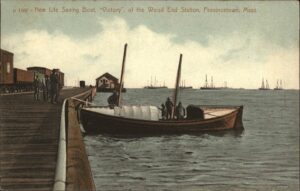This past week we all got a grim reminder of how unforgiving the sea can be, particularly with a small craft taken far offshore. A 17-foot boat was found upside-down off Gloucester. The four men in it lost their lives. The bodies of three have been recovered, while one remains missing. Our hearts go out to the families in the aftermath of such a tragic event.
The four who were lost set out on April 19 and were reported to have headed for fishing grounds near Jeffreys Ledge in the western Gulf of Maine, about 50 miles out to sea.
A 17-foot boat is a very small vessel for an oceangoing fishing trip, especially when you put four men and fishing gear in it. Throw in a 30-mile-an-hour northeast wind and water temperature in the mid-40s — the conditions that day — and you have a formula for potential disaster.

We’re slowly marching toward summer and all that comes with that. Before we get there, I want to put in a good word for boating safety.
Water is often an underestimated power in nature. Maybe that’s because it is paradoxically both life-sustaining and life-threatening. I have seen water bend steel, splinter fiberglass, and chew up wood. It is not something to take lightly — especially when offshore.
I don’t know what we can do to educate people on prudent — and life-saving — behavior when operating boats on the ocean. Still, events like this happen far too often, almost always resulting from a lack of education and hands-on experience.
Bringing this back to our local waterfront, we have a unique situation in that, even when we’re on land, we are actually sticking out roughly 25 miles from the mainland. What this means is that once you go past Long Point, the conditions are what you would normally find some 25 miles offshore.
I think many boaters here on the Outer Cape get a false sense of security when they see the land so close to them. Our sea conditions a mere hundred yards from the beach can be brutal if the wind is from a south to a northwest direction. Throw in our much-bigger-than-average tides, fueled by very strong currents, and a 17-foot boat can look awfully inadequate.
Our waters are fairly cold most of the year, too. A boater who is tossed into 40°-to-50° F water without survival gear will lose dexterity in five minutes and consciousness in 30 to 60 minutes. A personal floatation device will be of little help here other than making it easier for the Coast Guard to find your lifeless body. This is no joke: the waters here are fairly inhospitable most of the year, and those of us in recreational boats must conduct ourselves accordingly.
Not much changed this week on the fishing front. Striped bass are still slowly coming north, and migratory fish have been caught along Rhode Island’s shores, but there is nothing yet to speak of in the Canal or on our south shores.
Flounder fishing is still very slow, too. The right whales have not left the bay yet and continue to delight whale watchers who, with binoculars, can see them well from the beach.



